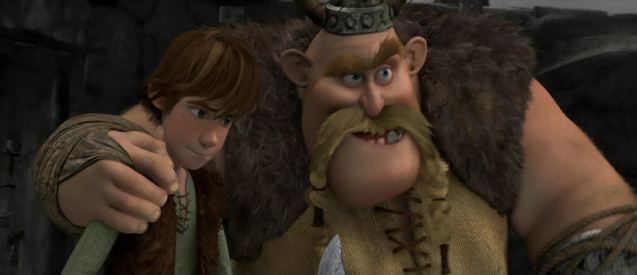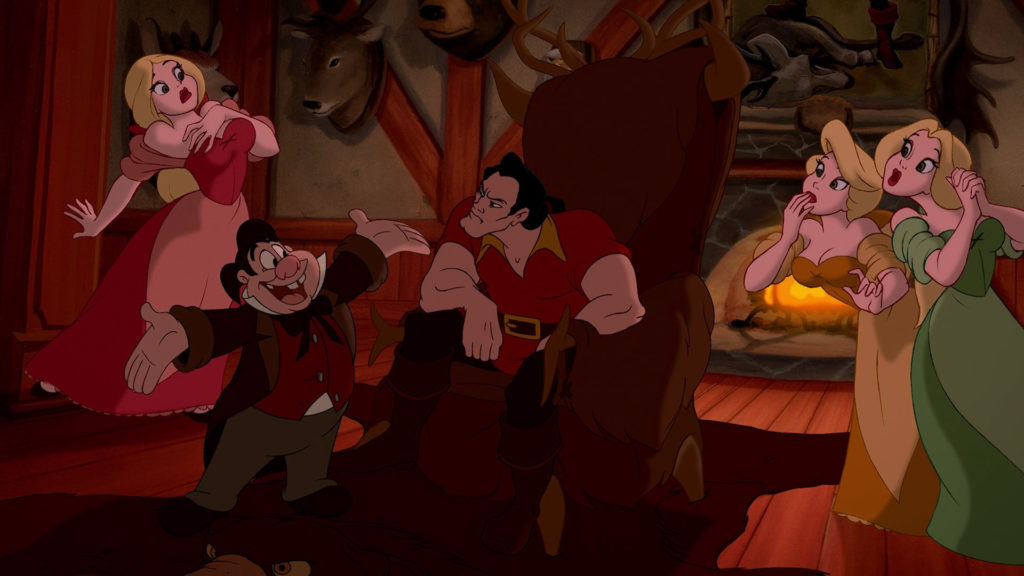Professing To Be Wise, They Became LeFous
Pundits are excited because Disney’s coming Beauty and the Beast remake will supposedly turn the sidekick LeFou “gay.” Says director Bill Condon of the March 17 release:
LeFou is somebody who on one day wants to be Gaston and on another day wants to kiss Gaston. … He’s confused about what he wants. It’s somebody who’s just realising that he has these feelings. And Josh makes something really subtle and delicious out of it. And that’s what has its payoff at the end, which I don’t want to give away. But it is a nice, exclusively gay moment in a Disney movie.
So it sounds like Disney has “told you whose team they prefer to be on”: for marketing purposes, anyway, the team of one of the world’s fastest-growing religions, sexualityism.
How should Christians respond to such attempts at religious teachings?
1. This is nothing new for Disney.
In 1997, evangelicals announced a boycott of the “no longer friendly to the family” Disney company (in the words of Dr. James Dobson). Now-defunct Disney-owned Miramax was making “gay”-friendly movies, and Disney parks hosted “gay days,” making the company a relatively early adopter of the LGBTQ agenda. And thus, many Christians responded.
Once Disney toned back, and once the rest of popular culture was clearly making boycotts nigh-impossible, the boycott faded. Solution: if your beliefs violate “family values,” simply redefine. Family is “a group of people based in love.” When every day is “gay day,” no day is.
2. Creators want to be ‘first’ at something; it gets attention.

Yo Frozen, we’ll let you finish, but Enchanted had the best fairy-tale-romance subversion of all time.
Recall all the hoopla about Frozen supposedly being the “first” Disney film to feature a Strong Female Fighting Character (forgetting Mulan, 1998), and the “first” Disney film to challenge the princess-instant-marriage stereotypes (forgetting Enchanted, 2007)?
Frozen was not “first” at either theme, rendering such boasts even less effective than the nerd who replies to a YouTube video or TV show review with the comment “First!”
Regarding the argument of which Disney character was the “first” homosexual, the jokes are already being made. It’s a rather silly argument, really—an “SJW” equivalent to fans who argue whether Wonder Woman or Aquaman would win in a fight.1
3. Even if you support the religion, this news is so lackluster.
 Remember the Abramsverse Sulu incident of 2016? The Gobber incident of 2014? Or even the Finding Dory incident also of 2016? None of these are truly the great strides into public “representation” history that LGBTQ advocates would surely want. In fact, these are such low-key examples that the people who want to push them as great-answers must instead distribute the “secret code” before the movie, via blog posts and interviews.
Remember the Abramsverse Sulu incident of 2016? The Gobber incident of 2014? Or even the Finding Dory incident also of 2016? None of these are truly the great strides into public “representation” history that LGBTQ advocates would surely want. In fact, these are such low-key examples that the people who want to push them as great-answers must instead distribute the “secret code” before the movie, via blog posts and interviews.
4. This will likely not change the heart of the story.
In each of those stories, the heart of the story remains very “traditional” relationships: Captain Kirk and the crew he respects and loves, Hiccup and his girlfriend Astrid along with his parents, and Dory and her long-lost parents.
If the director and Disney preserves the true soul of Beauty and the Beast, that a strong yet fair woman could truly learn to love a hideous beast and aid in his redemption—why all this attention for a side character who has little to do with this central plot?
Even if the new version shows LeFou as “gay,” would that change the absolutely central imaging of sacrificial love, respect, devotion, and commitment in the “tale as old as time”?
As I wrote in this satire of the Gobber incident of 2014:
“This assault on our values using Hollywood propaganda and the dark forces who oppose marriage will be rejected by honest hard-working Americans,” said Robert McBoreson, president and chair of the Family Values Research Heritage God Bless and Save America Foundation, utterly incognizant of the fact that the Hollywood film brainwashes viewers by showing the journey of a maturing young man to find himself, while also respecting the stories and perspectives of both his father and mother, who turn out to have had a short and yet blissful life of committed and romantic marriage that is upheld as the story’s ideal.
5. People thrive off getting us worked up for/against these things.
One investigation (albeit by a highly biased website itself) showed that at least in one case, the same company owned two outrage-mill websites, both a “left wing” and “right wing” website. In at least this case, the company had published a nearly identical outrage-mill story, but simply switched a few words around for the targeted audiences.
This is an extreme example. But it does remind us that with popular-culture controversies like this, the religion of LGBTQ-ism doesn’t “win” nearly as much as the clickbait publishers.

6. LeFou is the comic, stupid sidekick of the vainglorious villain.
This whole incident is another case of questionable “strides” for the sexualityism religion. One could conspiracy-theorize (but I would not) that this is, in fact, a scathing subversion of that religion. After all, the original LeFou is not a hero. He is a simpering buffoon with a man-crush on Gaston, who is an even more thoughtless and narcissistic fool. “LeFou” literally means the fool—and so, the “first gay” character is a fool. How is this not insulting?
7. This is still bad, in part because false religion makes stories worse.

We truly miss seeing you guys.
I do grieve when all these pundits, rumors, and even story-creators themselves get all excited about these fleeting notions. These elements of the stories will not last because this religious movement will not last. When people pay frivolous attention to the vulgar trim on one single character’s costume, they miss beauties of any “tale as old as time.” And increasingly, stories will be made solely to serve religious agendas, rather than vice-versa.
This is why my wife and I recently quit viewing “Supergirl,” four stories into the second season. After a largely successful and supergeek-pleasing first season, the creators wanted to cause-jack season 2. They took one character, gave her instant same-sex attraction, and insisted on showing this in an unrealistic, propagandistic light. It made the story suffer.
Beauty and the Beast, superhero tales, and other fantastical stories may indeed prove to become timeless. But this religion has no chance of lasting for eternity.
I don’t know if I care to see the new Beauty and the Beast. Right now the political/religious cause has subsumed all. Even if the moment turns out to be nothing, especially without the Secret LGBTQ Code, all this leaves a sour taste.
Disney, you had one job: remake one of your most classic animated features in a manner like your other popular live-action remakes, cast popular actors, promise nostalgia and originality all at once. But that wasn’t good enough. You had to go and act like this story only exists to preach a bad sermon. This is worse than the most moralistic Christian films.
8. This isn’t that bad because seeing the story won’t make you sin.
But if you do see Beauty and the Beast, it won’t make you sin.
Unless you’re tempted toward same-sex attraction yourself (which is simply another point on the Bible’s hideous yet ordinary lust-sin spectrum), the story can only “offend” you.
Creators and marketers have no way to know whether you used your ticket money to “sponsor” their propaganda campaign or simply meant to ignore that and enjoy the story. So most of the “boycott” logic Christians attempt—e.g., “if you go and see that then you are subsidizing sin”—doesn’t work. It can’t work. If you live in reality, you would “subsidize sin.”
This ends up being closer to a “meat sacrificed to idols” issue, again (1 Corinthians 8-10). In the very chapter where Paul should have used the “boycott” logic—“if you buy that meat then you are subsidizing sin”—he did not. He only spoke of loving weaker brothers.
Who are the “weaker brothers” here? Do you know a Christian struggling with same-sex attraction who is bothered by the movie? Then don’t invite that person to see it, or don’t mention you are seeing it, or consider not seeing the movie at all. Do you know a more-conservative Christian who thinks that seeing the movie is sinful, and would “stumble,” that is, be tempted to the same actual sin if you saw the movie?2 Then same solution.
But in either case, let’s recall where all sins—same-sex attraction, homosexual lifestyles, arrogance, and the root cause of all, idolatry—actually come from: the human self, not movies or any external thing (Mark 7). And always point not to fear of specific sins or their reflections in popular culture, but to Jesus Christ, beast-redeeming hero older than time.
Updated March 4: what’s actually in the film?
A professing Christian mom has seen Beauty and the Beast and recounts exactly what content is in it.3 As I suggested above, the actual “gay moments” sound at once fairly terrible and yet not as annoying as some would overplay them.
The bad:
1) Le Fou (Gaston’s sidekick) is clearly gay and clearly infatuated with Gaston much more obviously than any gay character has appeared in any other Disney movie. Unlike in Finding Dory, the homosexual content in this movie will not be missed by adults and older children for sure.
2) Le Fou starts giving Gaston a hand / shoulder / ear massage during the Gaston song that is definitely sensual from Le Fou’s perspective.
The tragicomic:
3) At one point toward the end, Gaston gets very close to Le Fou’s face; they are face to face and it looks like a romantic angle but Gaston is actually angry and yelling. It draws a direct contrast between what Le Fou wants and the fact that Gaston has really just been using his devotion all along
4) In the final dance scene, Le Fou is dancing with a woman but at the very end he cuts in on another couple and dances with a man. It was made to appear as a fortuitous accident.

Apparently cross-dressing is still allowed to be funny.
The just-plain comic:
In the final battle scene, three men are attacked by the wardrobe and dressed as women. Two of the men run off in horror and terror but the third decides he likes it and runs off happy as the wardrobe sings, “Be free.”
That last sounds nearly identical to the original 1991 animated film. In any case, apparently we are still “allowed” to laugh (and wince) at men who “crush” on other men, and men who dress like women.
Disney still clearly wants to play this up as some great cultural moment for the Sexualityism revolution. However, Disney also wants to have its “gay” wedding cake and eat it too. I’m still not hearing much that really separates this film’s characterization of LeFou from the LeFou of the original 1991 animated film. In either, LeFou is a tragicomic figure–a toadie and a man-crushing sycophant. How exactly is this supposed to aid the Sexualityist crusade?
And this much stays true: you still need to receive the Secret LGBTQ Culture Code beforehand, or you won’t actually know what a “revolutionary” moment this is for the cause.
Regardless, Christians are free to see or not see the film. We don’t need to feel any “command,” either to boycott the film because “Hollywood” is full of such unqualified evil, or to see it because It Must Be Engaged. Our only command is to avoid personal temptation, and for parents, to engage the story with your children if you do see it.
Meanwhile, the story itself follows “The Harkness Law” or “The Gobber Principle”:
Most mainstream, popular stories’ emotional cores are based on “traditional” relationships. Meanwhile, other relationships are relegated to side references, comic relief, or obvious political/social agenda add-ons.
Thus, even in this generation and despite decades of cultural propaganda, the film’s title and central theme have stayed the same. It is not Beauty and the Beauty, or Beast and the Beast, but Beauty and the Beast.
- Aquaman wins, but only if he can fight Wonder Woman in the ocean. ↩
- This is not the same thing as a conservative Christian who would simply judge you apart from Scripture if you saw the movie. Randy Alcorn explains the difference between actual “stumbling blocks” and mere “offendedness” in his article A Stumbling Block: What It Is and Isn’t. ↩
- As of 1:45 p.m. Eastern, this website was unavailable due to a server overload. ↩











































Your Point #6 is what had me upset. LeFou, of all characters? I suppose I will withhold judgment until I see the movie, but unless they do something to make LeFou a more sympathetic character, this is nothing more than the stereotypical effeminate villain. Not a step forward. Now, if they’d made Lumiere and Cogsworth gay, that would at least have been believable. They had a serious bromance going on, and great chemistry. But that would be too daring, wouldn’t it? They want to have their cake and eat it, too. #hypocrites
That’s a shame about Supergirl. We liked the first season but haven’t gotten around to the second season. As for Beauty & the Beast – these things always blow over as fast as they came up. Most people are going to completely ignore the hoolpa. I remember when people were having hysterics about certain side characters in the Lion King…
I was another one of the people who quit Supergirl. Not only was the gay thing an issue, but the racism moral was so poorly done I felt like banging my head into the wall, not because I think racism is okay, but because of the downright bad writing. The whole lesbian plot line would have been annoying even if it hadn’t been lesbian. (We had serious big issues going on, and instead of focusing on those, we get to see a character coming out to multiple people.)
I actually did a rant post about Supergirl on Tumbr, so I won’t repeat everything here. http://jessilroberts.tumblr.com/post/156919070461/supergirl-is-one-of-the-best-examples-i-can-think
Stupid five-second events that get blown way out of proportion. Like, that whole Finding Dory thing? Two woman who don’t even pass the benchel test.
What baffled me is how hearsay-y it sounded. Like someone took something and made it way bigger than it was. Also, if LeFou wants to kiss Gaston one minute and be him another, that sounds less like homosexuality and more like LeFou idolizing Gaston as “perfect, a pure paragon.” Or like homosexuality is just one piece of the equation, not a revolution that divides people.
It would be interesting if the idea they were playing with was homoeroticism (implicit or otherwise, this case being an “otherwise”) in male power fantasies. Like, not *** ~~ gaaaa-aaaay ~~ ***, but GAY. Like comic Captain America, who is too ‘roided up to really be attractive to women, but is still attractive for men for maybe not THOSE reasons but maybe also too THOSE reasons. Or He-Man.
But I don’t actually know if that’s where they’re going with this LaFou. Or it could be both about male power fantasies and that LeFou is also gay with bad taste in men.
I didn’t want or need to know that about LeFou (however aptly named he is). I don’t particularly think I’d be sinning if I watched the movie, but–watching him allude to his emotional confusion and lust onscreen–I do think could be legitimately seen as questionable and normalizing sinful behavior. Why go there?
And why bring that into my child’s life by letting her watch it either? There are some instances where I think it’s just a no-brainer not to go there.
If Hollyweird wants access to our entertainment dollars, then they can find a way not to offend us with their unnecessary additions to classic story lines that were already great, or their warped and twisted marketing efforts.
I don’t think of it so much as a boycott as “I’ve got better things to do. I will now go do them instead.” Their loss…
Very much so, since BATB is such a wonderful story and the original is one of the greatest animated films of all time.
My first response was in this order: “Oh brother, not again! Well, I hope they don’t make a big hairy (pun totally intended) deal out of it. But wait a minute *who cares* about LeFou!?” Annoying, yes, not cool absolutely, but not a big step forward for anyone. The story will suffer now, because of that stain on it. BATB is about loving the unlovable and seeing the best in people, and now that wonderful message will be sullied by this nonsense. Also, too bad about Supergirl. We’ll give it a chance when we get it, but if it’s as bad as all that… Sorry Kara and J’onn. For the record, I wasn’t going to see BATB in theaters because I wasn’t going to give the Mouse House the satisfaction.
Also, on stylistic grounds, I get you’re trying to make a point, Burnett, but you’re taking this gay-as-religion metaphor into more logical-fallacy territory (tho I can’t decide if it’s equivocation or false equivalence or false analogy or some other one the Wiki isn’t linking me to (I do like to be specific in my criticisms)).
Once you’ve identified the “fallacy,” do share. 🙂 But the fallacy behind most criticisms like this is the unspoken and assumed belief that there are such things as “nonreligious” beliefs. Not so. The human being is inherently a religious being.
In this case, Sexualityism is based on such religious tropes that it can be classified as a religion. It has everything: ontological certainty, sin, salvation, works, “holiness,” good versus evil, appointed leaders, institutions, calls to save-the-world and promises of present and future consequences and paradise/condemnation, and a modern tendency to hijack art for its own “greater” ends.
Except there is a technical definition to religion, and it’s not “certainty, sin, salvation, ‘holiness,’ good versus evil,” etc. Religion involves those things, but they aren’t exclusive to religion. Culture =/= religion. There aren’t actually any rites of gayness (brunch on Tuesdays?), or sacred texts of gayness. Popular =/= sacred.
I guess that makes this equivocation, because you’re using the word “religion” redrawn for a specific rhetorical function — hyperbole, really, to capture the audience’s attention — and then acting as if the word used in that specific context is the exact same as the word generally used. You also tend to use the word “sin” in this way, which because of it’s history as a word with a specific theological context is not a perfect synonym for “wrongdoing.” But that bugs me less than the “religion” one.
So do I get validation for my mislike of your argument now that I’ve been specific? I’m not so unreasonable as to expect you to agree with me, but I want some acknowledgement that my concerns are legit.
Also, I know you don’t want to give up a slick-sounding argument, but it’s ignorant at best and disingenuous the rest of the time, which will come back to bite anyone who uses it sooner or later.
I disagree with you about Disney’s reasons a bit. I think the reasons have to do with how the story is perceived by modern people–what is really going on is our culture has become so sexually obsessed it cannot imagine someone being fixated on another person in a non-sexual way as LeFous was shown to be in the cartoon. No, if you are interested in someone, it MUST be sexual. No, it is not possible to deeply admire someone and want to be like him or her. Some part of you MUST want to “do” that person. It is not possible to love or admire without sex! SEX SEX SEX.
That’s what the LeFous change is really about. Not about being PC or being “first.”
I tend to agree with you in your wider comment, although I’m not sure that in this case it fits. I feel that Disney IS actually trying to be PC with this move. But the whole obsessed with sex thing is very true. I was thinking this last night as hubby and I are finally watching Vikings. A British priest is taken as a slave from Lindisfarne to serve the “hero” (the Viking Ragnar) and is shown struggling with how to reconcile his faith with these dire happenings. Fair enough. But the first night he is with Ragnar and his wife he is invited into a three-some, which he refuses because of his faith (yay for the good guys). But you get the sense that he is gradually losing his faith and is admiring the Viking culture more and more until finally he goes to Upsala with the family and, under the influence of drink and magic mushrooms, finally gives in and joins the orgy that’s going on that is part of their worship of the gods (not sure this is historically accurate but I will have to reserve judgement on that as I don’t really know). So….it’s all about sex, in other words. There are myriads of other ways they could have portrayed his journey, but that is the marker they choose to portray his fall from faith. I suppose in a sense it’s an easy way to do it but still, it is telling this is the way they choose to do it.
Totally agree. I have a friend who spent time in Asia, (China/Japan/Korea) and over there, they don’t have this issue. You can have people that you love and it’s not sexual. I just watched my very first anime (Glitter Force aka Smile! PreCure) and I knew right off the bat that sexualization was going to happen because the girls held hands and hugged…. you know, things that real, perfectly normal, 12 year old girls do. In Japan, that’s seen as perfectly normal! Nothing sexual, just five girls being friends. I can’t bear the fact that friendships can’t be seen as what they are in this culture, and it’s obnoxious.
That fixation is definitely becoming the norm among some groups, Travis. Check out this article about the recent Lego Batman. (I saw the movie with my kids, and would not have reached this author’s conclusions in a million years. Perspective is everything.)
http://www.theroot.com/the-lego-batman-movie-is-the-brokeback-batman-we-ve-alw-1792203215